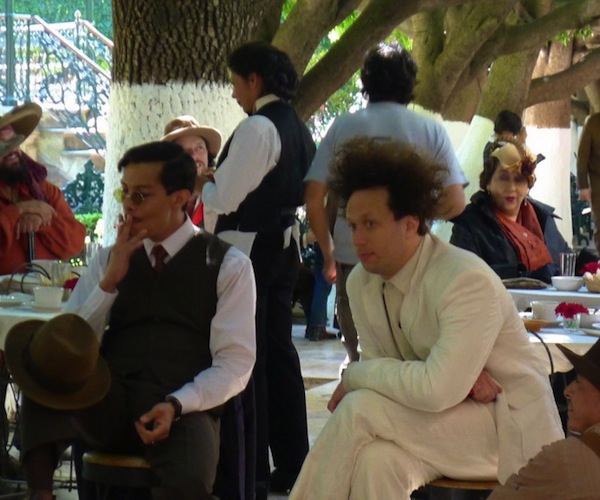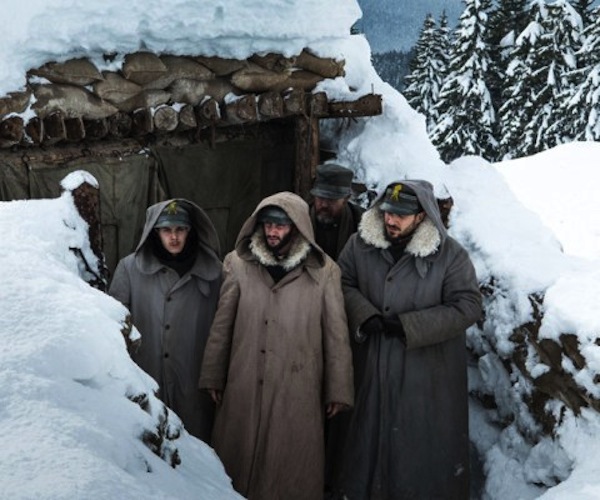Film Review: The 2015 Montreal World Film Festival — Step By Step
It’s always been fun, the best festival in North America to educate oneself with movies from foreign lands.

A scene from Peter Greenaway’s “Eisenstein in Guanajuato.” Photo: Karin S. DeBoer.
By Gerald Peary
The 1977 Montreal World Film Festival was my first film festival ever, and what a grand place to start, in romantic, exotic Quebec. I’ve ventured back probably twenty times since, including last week for the 39th Montreal Fest. It’s always been fun, the best festival in North America to educate oneself with movies from foreign lands. Several hundred new features are shown each year. But the challenge is always, which to see? About eight films play simultaneously each day starting at 9 AM, and I’m rarely familiar with many of them.
In 2015, I started out with works by two filmmakers with a track record and a reputation, England’s Peter Greenaway and Italy’s Ermanno Olmi.
Greenaway’s film, Eisenstein in Guanajuato, is a fictional guesswork about what the great Soviet filmmaker of The Battleship Potemkin was doing South of the Border in 1931, when he was ostensibly committed to a monumental documentary, Que Viva Mexico! Greenaway’s supposition is that Sergei (Elmer Back) was derailed by love, becoming gooey and giddy over a young Mexican professor (Luis Alberti) who was his guide. Why has this film been marginalized in the US, playing only at LGBT festivals instead of the arthouse circuit? One reason is that that Greenaway’s Eisenstein is off-putting, a dilettante and a fop, seeming to be anything but a world-renowned cineaste. A bigger reason I’d imagine is Greenaway’s kamikaze decision to feature lots of male frontal nudity plus a hardcore gay sex scene. The Mexican prof walks about with a boner, and there is a five-minute episode in which Sergei talks on and on while being anally penetrated. Is this the stuff for audiences safe with Mr. Holmes, Grandma, and Learning to Drive?
Olmi’s Greenery Will Bloom Again is a solemn, old-fashioned anti-war film by the 84-year-old director. In earlier years, he was ranked among Italy’s most important filmmakers because of such masterly works as Il Posto (1961) and The Tree of Wooden Clogs (1978). His new film is an honorable comeback. It occurs in a snowed-in army bunker under siege during World War I, where officers send poor soldiers out on idiotic death missions. Olmi’s World War I is, of course, meant to be every pointless, stupid war. But can the sincere pacifist message of Greenery Will Bloom Again be any more effective in, say, discouraging Isis than Jean Renoir’s Grand Illusion (1937) was in halting the Nazis?

A scene from Ermanno Olmi’s “Greenery Will Bloom Again.”
My next step at Montreal 2015: to see what was imported from the USA. Not much of worth. Several lame, silly sit-coms pushed to feature length. Several dour regional melodramas. Confession: I walked out quickly on all the above (I won’t give the titles). I did settle in with Silver Skies, a first feature written and helmed by Rosemary Rodriguez, a Boston native and Brandeis grad who has directed, among many teleplays, fifteen episodes of The Good Wife. The slim plot of Rodriguez’s film — residents of a senior facility balk when the owners want to convert to expensive condos — gives an excuse for an engaging cast of senior-age thespians to have a great time with a rare opportunity for screen time. Some of the actors deliver, I believe, the best performances of their careers, including ex-lady killer George Hamilton and ex-bombshell Valerie Perrine. Bouquets also to Barbara Bain, once of TV’s Mission: Impossible, and the wonderful Mariette Hartley, whom I love forever as the spunky ingénue in Sam Peckinpah’s Ride the High Country (1962). What makes Silver Skies ultimately appealing? Filmmaker Rodriguez’s clear affection for her silver-haired ensemble.
Step three at Montreal was a hunch. I opted for works by two young foreign directors, Rubaiyat Hossain and Jordan Goldnadel, because the festival catalogue revealed that they had studied at NYU’s Tisch School of Art. My intuition worked out. It led me to two delightful, accomplished first features.
We rarely get films from Bangladesh, much less directed by a woman, much less with a secular feminist sensibility. Hossain’s Under Construction is all of these. It’s the story of a stage actress in her thirties unhappy in marriage and also with the roles she is assigned to play in the theatre. Her private dissatisfactions are set against Bangladash’s far more dire public ills: exploited factory workers, boiling-over Islamic fundamentalism. Hossain makes the daring decision — many would say, blasphemous — to allow the female protagonist to have an adulterous affair and get away with it. In fact, she does not feel guilty at all when she returns to her smug businessman husband.

A scene from Jordan Goldnadel’s “Happy.”
What is more enthralling than a Gallic love story, even a melancholy one, if it’s told as confidently and wisely as Goldnadel’s Happy? Goldnadel is the handsome, capable star of his own movie. He plays a rich, somewhat lost, twenty-something Parisian who is captivated by a very pretty but perpetually angry young American photographer (Isabel Ryan) who takes his photo one day in a park. His parents are away on vacation, he brings her to his apartment, they have a relationship for a time, sometimes sexual, sometimes relaxing and good, often hurtful and off. Should they get deeper as a couple, even as she stubbornly hides her past? Unlike countless American indies which deal so immaturely with love, Happy gets it right and true, the feel of a youthful relationship we grow to care about becoming unmoored. Might I mention an impressive, decidedly erotic episode in the middle of the film, a night of dining and drinking which ends in a four-person bisexual orgy?
The final film I want to applaud at Montreal is Tandem, a taut “noir” crime melodrama from the Philippines. I saw it only because, in the lobby of the Fest hotel, I met by chance King Palisoc, its personable director. “Come see my film,” he said, and I did. Tandem is ripped from the headlines of Manila newspapers, tabloid warnings about criminal teams who ride about on motorbikes stealing women’s purses. Palisoc’s movie is a fictionalized story of one such team, two brothers who excel in their petty criminal life until they fall under the fatal eye of corrupt policemen. Palisoc brings to the Philippines what was in Hong Kong cinema of the 1990s: the crisp shootouts and orchestrated violence of John Woo and the cool sexuality of Wong Kar-Wai. I told Palisoc that one of his stars, the really good-looking one, reminded me of the late Leslie Cheung, who acted for both Woo and Wong. He was Hong Kong’s James Dean-like heartthrob until his tragic 2003 suicide. The young Tandemdirector thanked me, though he’d never heard of Cheung.
Gerald Peary is a professor at Suffolk University, Boston, curator of the Boston University Cinematheque, and the general editor of the “Conversations with Filmmakers” series from the University Press of Mississippi. A critic for the late Boston Phoenix, he is the author of 9 books on cinema, writer-director of the documentaries For the Love of Movies: the Story of American Film Criticism and Archie’s Betty, and a featured actor in the 2013 independent narrative Computer Chess

